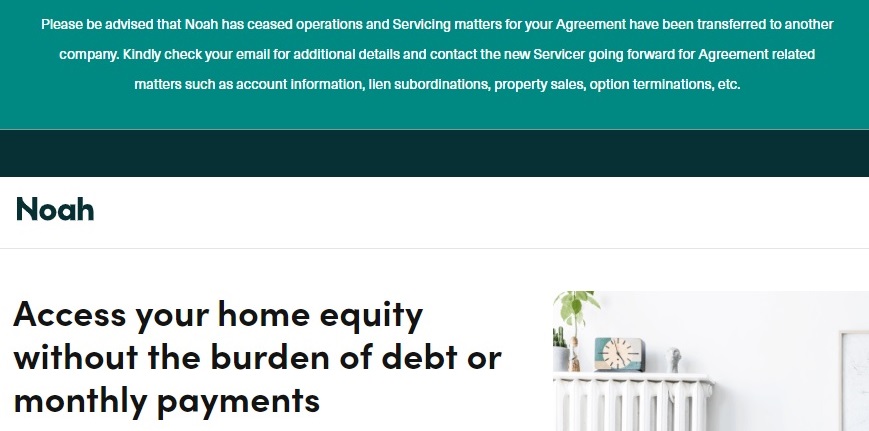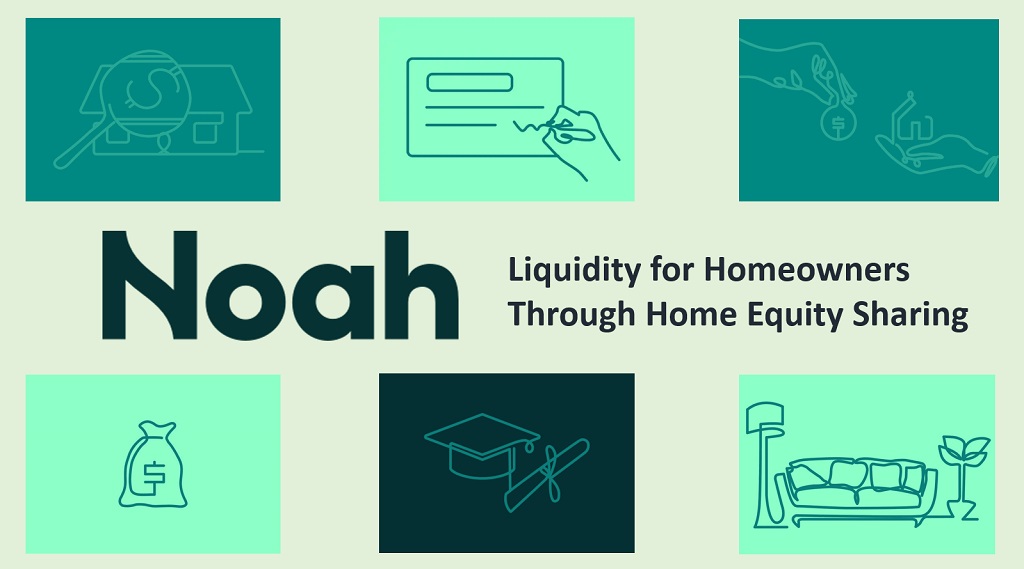Updated: October 21, 2022
UPDATE: Noah.co Has Ceased Operations
Per the message posted on the homepage of Noah captured below, the company ceased operations sometime in Q2 of 2022.
The company had previously posted that they had stopped accepting new applications as of March 22, 2022.
Noah’s former CEO, Sahil Gupta, also updated his LinkedIn profile with a position with Point that started sometime in September 2022.

The previous version of this article was last updated December 19, 2021.
[Original article written when Noah was still in operation]:
Are you an equity-rich, cash-poor homeowner who needs immediate access to cash for:
- Medical Expenses
- Education Costs
- Business Ventures
- Debt Reorganization
- Home Renovations, or
- Personal Use?
Shared Equity Funding might be an ideal solution to deliver immediate financial relief.
Update:
Noah has a new service, Down Payment Assistance, that helps first-time homebuyers provide larger downpayments in competitive real estate markets. The program, which enables homebuyers to reach or exceed the 20% down payment threshold, provides several benefits to homebuyers:
- Stronger Offers
- Access to Lower Mortgage Rates
- Reduced Monthly Payments
- No PMI Requirements
- Increased Purchasing Power
Solving the Market Problem of Being Equity-Rich and Cash-Poor
Technology and innovation have created new opportunities for entrepreneurs who can address a persistent problem with a fresh, alternative approach. Traditionally, one purchased a home, paid the mortgage each month, built equity in that home and tapped into that equity via a home equity loan, line of credit, or cash out refinancing.
Equity-rich Homeowners have always had the comfort of knowing that the wealth in their homes was available should emergency financing become an issue. However, fast forward to today, where a volatile market, festered by a virus and economic shutdown, has created a perfect storm of sorts. The underlying uncertainty has made qualifying for traditional HELOCs (Home Equity Lines of Credits), and other equity-based products extremely difficult, if not scarce.
Market Constriction of Home Equity Loans & HELOCs
Despite new Consumer Financial Protection Bureau (CFPB) lending rules, banks have been decreasing the number of home equity applications they process, and having already decreased their lending staff, having all but ceased the products known as HELOC or Equity Credit. In April of 2020, just as the markets began to reflect economic uncertainty, Wells Fargo, the largest mortgage lender in the country, and JP Morgan Chase, the fourth largest, both announced that they would no longer accept home equity lines of credit applications.
Simultaneously, a recent uptick in layoffs, furloughs and other job related interruptions have reduced equity-rich consumers’ cache as ideal credit risks, as stricter lending standards have reduced the number of loans being funded. Without W-2 income, homeowners no longer qualify for cash out refinancing, which has always been a financial mainstay of high-equity homeownership.
The HELOC markets may have dried up, but the bill collectors are still active. Need to tap into your home’s equity, but finding it difficult to get approved due to stricter underwriting standards for Home Equity loans? Enter Noah.
Noah’s Debt-Free Financing for Equity-Rich Homeowners
Founded in 2016 and based in San Francisco, Noah offers debt-free financing to homeowners in exchange for an equity share of the home via a shared equity contract.
By offering a twist on an age-old problem, Noah values consumers, who have faithfully paid their mortgage for years, who are now cash-poor yet equity-rich by becoming a silent partner in their home ownership. The company is betting big on future home value appreciation and in return, receives a percentage of this appreciation at the end of the contract term.
Noah is not a bank but instead a real estate investor partner that provides liquidity to homeowners. The company makes money when the homeowner makes money and shares in the loss if the valuation should decrease after the term period. Another attractive feature of this partnership funding is that there are no recurring monthly payments, so more funds can be used immediately to start home improvement projects, reduce debt or for whatever you choose.
Noah’s Ideal Customer
Noah’s ideal customer is a homeowner who is looking to restore his financial footing due to past setbacks or upcoming needs. Perhaps they are over leveraged with personal loans or credit cards, looking to renovate their home, or simply want add to their cash reserves. A common thread is homeowners who are feeling the pinch of cash-flow and are now playing “catch up” with their finances. According to Noah, 68% of its customers use their equity-based funds to pay off some type of debt, such as medical, credit cards, or car loans.
Another appealing aspect of shared-equity financing is that it is not a credit product, so the funding will not appear on a credit report or as part of one’s credit score calculation.
Noah’s liquidity partnership can also be used to improve a homeowner’s financial standing expediently during a challenging personal financial crisis.
Getting Started with Noah
The process is simple, as homeowners can prequalify online in less than 60 seconds. It is important to note that you need a minimum of 25% equity in your home. For example if your home is worth $600,000, the balance of your mortgage can be no more than $450,000. Also note that due to the areas in which Noah currently operates, they do not accept applications for homes valued less than $300,000.
A positive prequalification result allows you to proceed to the next step of completing an application. Once the application is submitted, the average turnaround for approval and funding is 15 days.
Behind the scenes, Noah is preparing the underwriting for your contract, which includes an appraisal of your home by an independent, certified residential appraiser to arrive at the home’s current value.
There is no minimum lock up period, or prepayment penalty, should your financial picture change and you find that you are able to pay off Noah’s equity share sooner than the contracted term.
Depending on your situation, you can request from $35,000 to $350,000.
Steps to Receive Equity-Based Funds from Noah
- Get an Estimate at Noah.co
- This is a pre-approval step that won’t affect your credit score
- Submit an Application
- Application approval process takes on average 15 days (including funding)
- Schedule Your Home Appraisal
- Sign Funding Offer
- Percentage of Appreciation Share is specified
- Get Funds
- Money is transferred within 24-to-48 hours
- Pay Noah
- You can pay anytime before the end of the contract term (5 or 10 years), including when you sell your home
How Much Does Noah Cost?*
These types of home equity investments are NOT loans, so there is no monthly payment. The final cost is a formula that includes the initial funding amount PLUS or MINUS Noah’s percentage of appreciation/depreciation value of the home at the time the contract is terminated.
The final payment amount may end up being higher when compared to a conventional home equity loan if your home appreciates more rapidly than historical trends. That said, a major benefit of this type of funding is the ability to leverage interest-free money for up to a 10-year period. These funds can then enable recipients to restructure current debt or make other investments to be used as working capital.
Example Noah Shared Equity Scenario:
Funds Requested by Homeowner: $50,000
Initial Home Value: $700,000
Risk Adjusted Home Value: 86% of initial value = $602,000
Home Value at the Time of Contract Termination: $850,000
Home Appreciation: $248,000 = Final Home Value ($850,000) LESS Risk Adjusted Home Value ($602,000)
Noah’s Share of Equity Appreciation: 25%
Noah’s Equity Share Payout: $62,000 = 25% of $248,000
Total Amount Owed to Noah: $112,000 = $50,000 (original funded amount) + $62,000 (Noah’s share of appreciated value)
*These are representative numbers. Noah’s home advisor team will confirm the exact percentages of your agreement dependent on your specific situation.
The key numbers to focus on are:
- Percentage of the Funding Request to the Home Value
- Noah limits this percentage to 20%, so if your home is worth $500,000, the max funding you could receive would be $100,000
- Percentage of the Risk Adjusted Home Value
- To cover future closing costs and to adequately cover the future cost-of-capital for the funds provided, it is necessary for Noah to adjust the initial home value downward within the range of 14% to 20%
- Share of Equity Appreciation
- This is the share that Noah will be allocated for the appreciation or depreciation when the contract terminates
- If your home appreciates by $100,000 and Noah’s equity appreciation share is 20%, Noah would receive $20,000 of the appreciation amount, in addition to the funding amount
- Conversely, if a home were to depreciate by $50,000 with an appreciation share of 20%, proceeds to Noah would be reduced by $10,000
Homeowners have financial incentive for the Risk Adjusted Home Value to be as high as possible and to strive for a lower Share of Equity Appreciation. Homeowners with the strongest positions (e.g. lots of equity, strong financial footing, desirable neighborhood, etc.) will have greater bargaining power. In other words, homeowners that present lower risk will receive more favorable terms than those who are in riskier situations.
New Offerings from Noah
Cap to All Home Value Investments
On May 4, 2021, Noah announced a max cap to all home value investments, which will allow homeowners to keep more of their home equity gains should their homes continue to appreciate rapidly while under contract with Noah. With a Capped Investment, the annual buyout amount will be capped at an 18% implied APR to limit the amount paid to Noah upon exit. Noah further clarifies that the 18% implied APR is not an interest rate, rather it is the maximum rate that the payback amount owed to Noah can increase in any given year.
New 5 Year Term Option
Based on feedback from homeowners, Noah also introduced a new 5 year term length, available to homeowners in select markets with a minimum credit score of 720. If your home qualifies for the 5 year term, you’ll be offered Noah’s lowest possible pricing.
Summary of Eligibility Qualifications and Requirements
- Home must be in a geographic location currently served by Noah
- Homeowner must have at least 25% equity in the home
- Home must be valued between $300,000 and $3,500,000
- Range of funding: $35,000 to $350,000
- Minimum Credit Score: 600
- Closing Fee: $2,000 or 3% of the financing amount, whichever is greater (deducted from the funding amount)
- Max Term: 10 years. The average term for current client partners is 5-7 years.
- Homeowner must verify sufficient income or savings to cover current mortgage and debt obligations
- Homeowner’s debt-to-income (DTI) ratio should be 60% or less
- If homeowner’s DTI is above 60%, Noah funds must be used to pay down debt
- Homeowner must not have multiple 60-day or 90-day delinquencies on credit report
- Homeowner cannot be in an active bankruptcy proceeding or foreclosure, but can be in forebearance
- Homeowner must not have more than 3 existing liens on his property, including mortgages and HELOCs
- If homeowner has more than 3 liens, Noah financing must be used to pay them down
- Home should not be under major construction at the time of application, beyond ongoing home repairs and minor renovations
- Home cannot be a cooperative housing unit (co-op)
To see up-to-date details visit Noah’s Eligibility page.
Noah’s Pros & Cons
Is a Noah Equity Sharing Partnership Right for You?
It depends on your current financial situation. Given that the preapproval process is easy and does not affect your credit score, we strongly recommend getting an estimate of what Noah could offer you. Additionally, you should consider how to best use these funds if choosing Noah. Here are pros and cons to consider, as well.
Pros
- Noah is able to provide funding to homeowners, even if facing unemployment or reduced income
- Unlike banks, Noah will partner with homeowners that are not employed as full-time employees, such as entrepreneurs, self-employed workers, or other 1099 employees
- Noah funding can be used for anything, including financing your next home renovation, paying down current debt or financing another home
- No monthly payments – contract terms are flexible up to 10 years depending on your individual contractual agreement
- Noah shares risk with the homeowner
- Terms are not tied to current interest rates or broader macroeconomic policy
- Noah’s financing does not appear on the homeowner’s credit report and does NOT affect your credit score
- The application process is simple and available online – the access to cash is faster than a traditional bank, as funding can be received in as few as 15 days.
- Funding is not a taxable event
- Funding does not affect property tax protection under California Prop 13 (e.g. if you change ownership of a home, a home can be reassessed for taxes However, Noah does not appear on the title as they are investors and property taxes are NOT reassessed)
- Noah’s Homeowner Protection Program: provides qualifying customers access to an additional $10K in funds, to apply to home repairs, mortgage payments, or property taxes
- Noah offers more flexibility than traditional lenders, which means that they can accommodate a wider range of homeowner profiles
Cons
- Noah does not enter into equity partnerships with homeowners whose property is valued less than $300,000
- Noah has a total funding limit of $350,000
- The total cost-of-capital for funding will be significantly higher than conventional loans, due to not having to make monthly payments
- Since Noah is not a bank, but an equity partner in your home, the transaction will result in a lien on your property versus the case of an unsecured personal loan
- At the end of the contract term you will be responsible for the balloon payment if you choose NOT to sell your home
Creative Uses for Noah Funding
Though our audience will likely be interested in using Noah funding for major home renovation projects and restructuring debt, there are several creative uses that could generate recurring revenue for homeowners well into retirement age. Not having monthly recurring payments, like with traditional loans, will free up cash to pursue and grow these entreprenurial opportunities:
- Accessory Dwelling Units (ADUs)
- ADUs can provide steady monthly rental revenue with the shortage of affordable housing in many markets. Also read our overview of the many benefits of prefab ADUs.
- Vacation Rentals
- Popular peer-to-peer vacation rental platforms like Airbnb and VRBO can offer significant earning potential for the right properties in the right locations
- Self-Storage Solutions
- Emerging peer-to-peer self-storage platforms like Neighbor offer easy, low-maintenance recurring revenue
- Seed Money for New Businesses
- Funds can be used to kickstart new businesses
Markets Currently Served by Noah
Noah’s offerings are currently limited to the following geographic areas listed below. If your location is not yet active, you can sign-up to be notified when it is available, on their Available Areas page.
California
- Los Angeles, San Diego, San Francisco, San Jose, San Luis Obispo, Santa Barbara, Santa Cruz, Santa Rosa, West Riverside
Colorado
- Boulder, Colorado Springs, Denver, Fort Collins
District of Columbia (DC)
Maryland
- Annapolis, Baltimore, Bel Air, Columbia, Cumberland, Dundalk, Towson
Massachusetts
- Amherst, Boston, Cape Cod, Lowell, Newburyport, North Hampton, Pittsfield, Rockport
New Jersey
- Bridgewater Township, Camden, Cherry Hill, Clifton, Edison, Hackensack, Hoboken, Jersey City, Newark, Ocean City, Paterson, Princeton
New York
- Albany, Binghamton, Buffalo, the Finger Lakes, Long Island, New York City, Saratoga Springs
Oregon
- Portland
Utah
- Ogden, Provo, Salt Lake City
Virginia
- Blacksburg, Bristol, Charlottesville, Harrisonburg, Newport News, Norfolk, Roanoke, Virginia Beach
Washington
- Seattle, Tacoma, Vancouver
Competitive Comparison
Shared Equity Contracts are not new, but have suddenly become a popular option in today’s economic climate. Due to the increased home wealth that many Americans have acquired over the years, this option is attractive for its postponement of monthly payments and instant liquidity.
Though the four vendors listed in the table below have relatively similar offerings, we strongly recommend judging each of them on customer service – i.e. do they treat you with respect and do they deliver on their promises?
The fact that Noah has continued to aggressively serve homeowners through 2020’s turblulent market has most impressed us. We are also optimistic on their long-term plans to build out their partnership with homeowners by adding other trustworthy vendors into the relationship, such as real estate agents and home improvement vendors.
| Noah | Hometap | Point | Unison | |
| Origination Fee | $2,000 or 3% whichever is greater | 3% | 3%-5% | 3.9% |
| Share of Appreciation | 15%-40% | 10%-30% | 25%-40% | 15%-25% |
| Min Credit Score | 600 | 600 | 500 | 680 |
| Max Debt-to-Income Ratio | 60% * | 40% | 65% | 43% |
| Max Contract Term | 10 Years | 10 Years | 30 Years | 30 Years |
| Max % Funding to Home Value | 20% | 30% | 20% | 18% |
| Max Funding Amount | $350,000 | $300,000 | $350,000 | $500,000 |
| Markets Served | Select areas in: CA, CO, DC, MA, MD, NJ, NY, OR, UT, VA, WA | AZ, CA, FL, MA, MD, MI, MN, NC, NJ, NY, OR, VA | Select areas in: AZ, CA, CT, CO, DC, FL, IL, MA, MD, MI, MN, NJ, NY, NC, OR, PA, VA, WA | AZ, CA, CO, CT, DC, DE, FL, GA, IL, IN, KS, KY, MA, MD, MI, MN, MO, NC, NJ, NM, NV, NY, OH, OR, PA, RI, SC, TN, UT, VA, WA, WI |
Next Steps
Get a free estimate at Noah that will not affect your credit score!
More Information on Noah
Noah Website
Noah Free Estimate Form
Noah Frequently Asked Questions (FAQs)
Noah Available Areas
Noah Customer Success Stories
Noah Eligibility Guidelines
Noah Trustpilot Profile
Related Articles
How to Tap Into Your Home Equity without Adding Debt
Why Homeowners Should Invest in a Prefab ADU
Budgeting for a Home Renovation Project
Monetize Your Unused Space With The “Airbnb of Storage” Neighbor.com
| Purgula is reader-supported. When you click on links to other sites from our website, we may earn affiliate commissions, at no cost to you. If you find our content to be helpful, this is an easy way for you to support our mission. Thanks! Learn more. |







